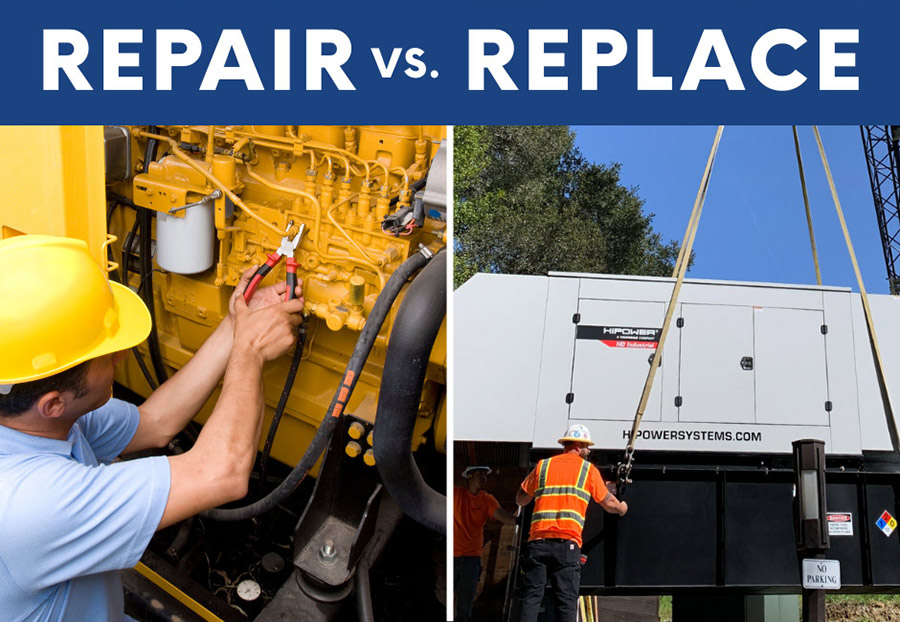
How long should you keep repairing an aging generator before it costs more than it’s worth?
For many commercial and industrial operations, backup power is essential, but the systems providing that power don’t last forever. As generators age, performance declines, maintenance costs rise, and compliance with modern standards becomes more difficult.
At some point, every facility faces a critical decision: repair or replace?
Global Power Supply helps businesses assess their options every day. Here’s what to consider when deciding the best path forward for your power system.
Signs You May Need an Upgrade
1. Frequent Breakdowns or Hard-to-Source Parts
If your generator is increasingly unreliable, requiring more frequent repairs or suffering unplanned outages, that’s a red flag. Downtime from generator failure can cost far more than the repair bill itself. Compounding this issue, many older models rely on discontinued parts that are expensive or difficult to find, leading to longer service delays and higher maintenance costs.
2. Failing Emissions Compliance
Environmental regulations across the U.S. and in many regions are becoming more stringent. Older diesel generators often fall short of today’s emissions requirements for new installations. While federal rules do not mandate upgrading all existing units, some states and local air quality districts, such as California’s CARB, may impose limits on the operation of non-compliant generators or require retrofits for permitting. If your unit can’t meet current emissions standards and is subject to regulatory oversight, you may face operational restrictions or the need to upgrade.
3. Outgrowing Your Original Load Capacity
Businesses grow. What once was a properly sized generator may now fall short of your facility’s current power needs. Running a generator at or near maximum capacity for extended periods can lead to premature wear and risk system failure during peak demand. If you’ve added equipment or expanded your operations, it may be time to consider a larger or modular generator system.
4. Lack of Modern Monitoring and Control Features
Legacy generator systems often lack today’s smart capabilities, such as real-time diagnostics, load management, and remote monitoring. Modern generators offer advanced integration with automatic transfer switches (ATS), UPS systems, and remote dashboards – giving you better visibility, faster response time, and more control over your power infrastructure.
Cost Comparison: Repair vs. Replace
When weighing repair against replacement, many organizations focus only on the upfront cost. But the true picture includes operational risk, long-term expenses, and lost opportunity.
Short-Term Savings vs. Long-Term Costs
While repairing a generator may seem cheaper in the short term, recurring service calls and replacement parts can quickly add up. Over time, investing in a new, efficient generator may offer a better return and lower cost of ownership.
Risk of Downtime During Repairs
An aging generator that fails during a power event could mean hours or days of downtime. If uptime is critical to your operations, relying on a repair strategy may be too risky. New units also often come with warranties and service support that minimize your exposure to unexpected failures.
The Advantages of New Technology
Upgrading your generator isn’t just about replacing something broken. It’s an opportunity to take advantage of advancements that can make your operations more efficient, compliant, and resilient.
Improved Efficiency and Lower Emissions
Today’s diesel and natural gas generators are more fuel-efficient and designed with cleaner combustion technologies. In addition to lowering operating costs, they help meet regulatory requirements and support sustainability goals.
Better Automation and Integration
Modern systems integrate easily with building automation systems, load banks, ATS, and UPS equipment. These features allow for faster transfer times, smarter load management, and remote control, all of which enhance reliability and reduce the burden on your facilities team.
Remote Monitoring and Predictive Maintenance
With built-in telemetry and IoT-enabled systems, new generators can alert you to potential problems before they cause failures. Predictive maintenance tools can help you plan service intervals more effectively and avoid unexpected issues.
Conclusion: Don’t Leave Power Reliability to Chance
If your current generator is showing signs of age, struggling to meet new demands, or costing more in upkeep than it’s worth, it may be time to consider an upgrade. A professional evaluation can provide the clarity you need to make the best decision for your facility and your budget.
Global Power Supply offers diesel and natural gas generators for commercial and industrial applications, along with expert guidance on sizing, emissions compliance, system integration, and more. Our team is here to help you assess whether it’s time to repair or replace, and make sure you have the right solution for your power infrastructure.
Need help assessing your system?
Contact Global Power Supply today for a free consultation.